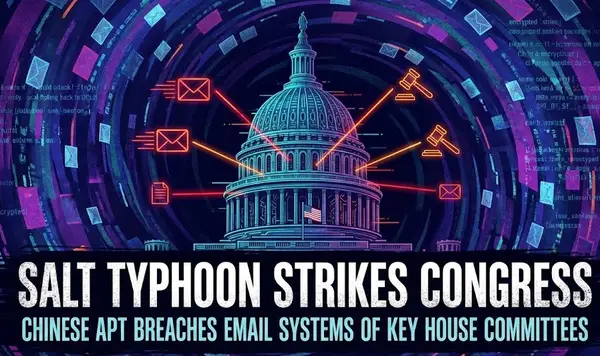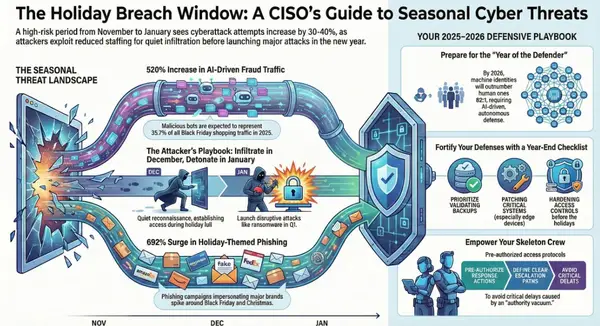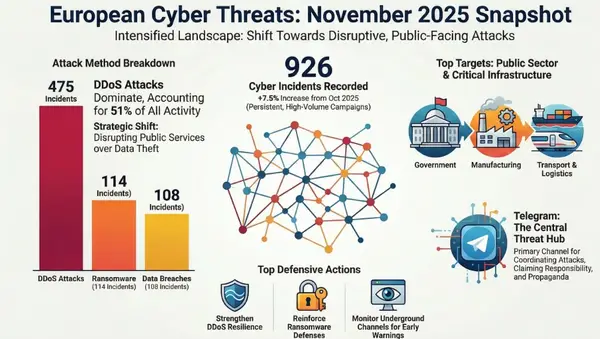Volvo Group North America Hit by Massive Third-Party Ransomware Attack: 870,000+ Accounts Exposed

Executive Summary
Volvo Group North America has disclosed a significant data breach affecting current and former employees after a devastating ransomware attack on Swedish HR software provider Miljödata. The August 2025 attack, claimed by the emerging DataCarry ransomware group, exposed employee names and Social Security numbers, and was part of a much larger breach that impacted approximately 870,000 email addresses across Sweden's public and private sectors. The incident represents one of the most disruptive supply chain attacks to hit Sweden in years, affecting 80% of the country's municipalities, multiple universities, and at least 25 major corporations.
The Breach: Timeline and Discovery
Initial Attack
The ransomware attack on Miljödata occurred on August 20, 2025, and the company discovered it three days later on August 23. Miljödata CEO Erik Hallén confirmed on August 25 that the attack was an extortion attempt demanding 1.5 bitcoins—approximately 1.5 million Swedish kronor ($168,000 USD).
Volvo Group Impact Confirmed
Volvo's data was confirmed to be affected on September 2, 2025. The company filed a formal breach notice with the Massachusetts Attorney General's office on September 24, 2025, notifying affected employees of the compromise.
Public Disclosure and Data Publication
The DataCarry ransomware group added Miljödata to its Tor-based leak site on September 13 and published data allegedly stolen from the company. On September 16, the leaked information was added to the data breach notification site Have I Been Pwned, which revealed that it included 870,000 unique email addresses, along with names, addresses, phone numbers, government IDs, dates of birth, and gender.
Compromised Systems and Data
Miljödata's Critical Infrastructure
During the attack, hackers stole personal information from Adato, a support system for rehabilitation, and Novi, a support system for HR personnel notes.
Miljödata's primary product, Adato, handles some of the most sensitive aspects of Swedish workplace administration including medical certificates documenting employee sick leave and rehabilitation plans for workers recovering from injuries or illness.
Volvo-Specific Data Exposure
For Volvo Group North America employees, the compromised data included:
- First and last names
- Social Security numbers
Importantly, no payroll, bank account details, or insurance information appear to have been accessed.
Broader Breach Impact
The full scope of the Miljödata breach extended far beyond Volvo:
The incident impacted approximately 25 private companies, including large companies such as Scandinavian airline SAS and metals company Boliden, and roughly 200 Swedish municipalities, including the country's capital Stockholm.
Numerous education institutions, such as University of Borås, Linköping University, Lund University, Örebro University, and the Swedish University of Agricultural Sciences, also disclosed the impact from the attack.
For other affected organizations, the data exposure was more extensive, with employees losing their names and personal identity numbers (Sweden's equivalent to SSNs), along with gender, dates of birth, employment details, contact information including phone numbers, home addresses, and 870,100 email addresses.
The Threat Actor: DataCarry Ransomware Group
A New Player in the Ransomware Ecosystem
DataCarry is a newly observed ransomware and data-extortion operation, first seen in May 2025. DataCarry targets mid- to high-profile businesses in sectors such as insurance, healthcare, aerospace, and legal services.
The emerging threat actor's targets span across multiple industries, including healthcare, finance, legal, aviation, retail, and manufacturing, with victims located in Europe and North America.
Modus Operandi
The group operates a double-extortion model, exfiltrating data and threatening publication via a Tor-hosted portal. As of October 2025, DataCarry has claimed 14 known victims across multiple countries.
The Scale of Sweden's Crisis
Critical Infrastructure Dependency
Miljödata provides software to around 80 percent of Sweden's 290 municipalities, making it a critical piece of digital infrastructure for the country's local government operations.
Unprecedented Disruption
Around 200 of Sweden's municipal governments were impacted, affecting everything from small rural communes to major cities like Gothenburg, Karlstad, and Luleå.
So far, approximately 250 customers of Miljödata have reported to the Swedish Authority for Privacy Protection (IMY) that they have been affected, including at least 164 municipalities and four regions.
Services Affected
Miljödata's Adato sick leave management system, Stella work-related injury reporting system, and Novi HR management system were all taken down by the attack.
The practical impact was severe: HR managers were suddenly forced to handle sensitive medical documentation with "paper and pen," according to one IT manager in Luleå describing their backup plan.
Volvo Group's Response
Immediate Actions
Upon learning of the breach, Miljödata engaged external cybersecurity experts to conduct a comprehensive forensic investigation and to enhance the security of its hosted environment.
Volvo Group immediately launched its own internal review of vendor management and data-protection policies to prevent similar events in the future.
Employee Support Measures
Volvo Group is providing the affected individuals with 18 months of free identity protection and credit monitoring services.
Specifically, Volvo Group is providing a complimentary 18-month subscription to Allstate's Identity Protection Pro+ service, which includes tri-bureau credit monitoring, monthly credit score tracking, dark-web monitoring, and full-service identity restoration assistance.
Transparency and Communication
The company has not publicly disclosed the exact number of affected employees. However, Volvo has been proactive in notifying impacted individuals through both email and postal mail, providing detailed enrollment instructions for the identity protection services.
Sweden's National Response
Government Coordination
Swedish minister for civil defence Carl-Oskar Bohlin stated: "The government is receiving ongoing information about the incident and is in close contact with the relevant authorities".
Regulatory and Law Enforcement Involvement
The breach was reported to Swedish police, and CERT-SE, part of the Swedish Civil Contingencies Agency which handles and prevents IT incidents, is currently in close collaboration with the affected company.
As of late August, the Swedish Authority for Privacy Protection (IMY) had received around 450 reports related to the incident.
Long-Term Policy Implications
Minister Bohlin acknowledged that the incident "underscore[s] the need for a high, fundamental level of cybersecurity throughout society" and announced plans for new cybersecurity legislation with increased requirements for various actors.
The Third-Party Risk Problem
Single Point of Failure
This incident starkly illustrates a critical vulnerability in modern digital infrastructure: over-reliance on single suppliers. When 80% of Swedish municipalities depend on one company for essential HR systems, that company becomes a single point of failure for the entire local government ecosystem.
The Cascade Effect
By targeting Miljödata rather than individual organizations, the attackers achieved maximum disruption with minimal effort. Security expert Anders Askasen, vice president of product marketing at Radiant Logic, noted: "For municipalities, universities, and even big corporations like Volvo, this isn't just a security issue, it's an integrity issue. People suddenly wonder whether the systems handling their most sensitive data are fit for the purpose, and with good reason. That loss of confidence is as damaging as the leak itself".
Part of a Broader Auto Industry Attack Wave
The Volvo breach occurred during an unprecedented wave of supply chain attacks targeting the automotive industry:
Stellantis (September 21, 2025)
The ShinyHunters group breached Stellantis, parent company to consumer vehicle brands like Chrysler, Dodge, and Jeep, and luxury brands like Alfa Romeo and Maserati, claiming to have stolen customer names and contact details from the company's Salesforce instance.
Jaguar Land Rover (August 31, 2025)
"Scattered Lapsus$ Hunters"—a collaboration between hackers from ShinyHunters, Scattered Spider, and the Lapsus$ group—attacked Jaguar Land Rover, forcing the company to pause production the following day. Factory lines remained halted and employees were instructed to stay home for weeks thereafter.
This clustering of attacks suggests coordinated targeting of the automotive sector's supply chains.
Technical Analysis and Attack Vector
While the exact entry point for the Miljödata breach has not been publicly disclosed, the attack followed common ransomware patterns:
- Initial Access: Likely through compromised credentials, vulnerable systems, or social engineering
- Lateral Movement: Spread across Miljödata's cloud infrastructure
- Data Exfiltration: Systematic theft of data from Adato and Novi systems before encryption
- Encryption: Deployment of ransomware to lock systems and disrupt operations
- Extortion: Demand for 1.5 bitcoin payment with threat of data publication
- Publication: Release of stolen data on dark web leak site after non-payment
The relatively small ransom demand of approximately $168,000 USD suggests DataCarry is a newer, smaller operation compared to established ransomware-as-a-service (RaaS) platforms that typically demand millions.
Impact on Affected Individuals
Identity Theft Risks
For Volvo employees whose Social Security numbers were exposed, the risks include:
- Financial Fraud: Opening credit accounts, applying for loans, or filing fraudulent tax returns
- Medical Identity Theft: Obtaining medical services or prescription drugs using stolen identity
- Synthetic Identity Creation: Combining real SSNs with fabricated information to create new identities
- Employment Fraud: Using stolen identities for background checks or employment verification
For Swedish Citizens
The exposure of Swedish personal identification numbers (personnummer) creates similar risks adapted to Sweden's identity systems, including potential fraud related to:
- BankID authentication systems
- Government services access
- Healthcare records
- Tax and benefits claims
Broader Data Subjects
For the 870,000+ individuals whose email addresses and additional PII were exposed, risks include:
- Targeted Phishing: Sophisticated social engineering attacks using legitimate personal details
- Credential Stuffing: Using exposed emails to attempt access across multiple platforms
- Business Email Compromise: Impersonation of legitimate business contacts
- Harassment and Doxing: Public exposure of personal information
What Affected Individuals Should Do
Immediate Actions
- Verify Communications: Only trust notifications from official Volvo email addresses or postal mail
- Enroll in Monitoring: Activate the complimentary 18-month identity protection service
- Credit Freeze: Consider placing a security freeze on credit reports with all three bureaus
- Password Changes: Update passwords for critical accounts, especially those using the same email address
- Enable MFA: Activate multi-factor authentication on all sensitive accounts
Ongoing Vigilance
- Monitor Statements: Regularly review bank, credit card, and medical statements for unauthorized activity
- Check Credit Reports: Request free annual credit reports and review for unfamiliar accounts
- Watch for Phishing: Be suspicious of emails or calls requesting personal information, even if they reference accurate details
- Employment Verification: Monitor credit reports for unauthorized employment inquiries
- Tax Filing: File tax returns early to prevent fraudulent filings
For Swedish Residents
- Monitor BankID: Watch for unauthorized authentication attempts
- Skatteverket Alerts: Sign up for notifications from the Swedish Tax Agency
- Credit Checks: Use Swedish credit monitoring services like UC or Bisnode
- Police Report: Consider filing a report with Swedish police (Polismyndigheten) for potential identity theft protection
Lessons for Organizations
Vendor Risk Management
This breach provides critical lessons for vendor security:
- Due Diligence: Conduct thorough security assessments before vendor engagement
- Continuous Monitoring: Implement ongoing security evaluations, not just initial audits
- Contractual Requirements: Mandate specific security controls and breach notification timelines
- Data Minimization: Limit sensitive data shared with third-party vendors
- Access Controls: Implement strict least-privilege access policies for vendor systems
Supply Chain Security
Security experts emphasize that "For municipalities and other public-sector entities, this event shows the urgent need to treat third-party and supply chain security as a core pillar of resilience. That means maintaining full visibility into all connected systems and taking on the responsibility of continuously assessing the security posture of vendors".
Incident Response Preparedness
Organizations should:
- Maintain contingency plans for vendor failures
- Develop manual backup procedures for critical systems
- Establish clear communication protocols for breach notifications
- Practice vendor breach scenarios through tabletop exercises
Reducing Single Points of Failure
The Miljödata incident demonstrates the dangers of excessive market concentration. Organizations and governments should:
- Diversify critical vendors where feasible
- Evaluate multi-vendor strategies for essential services
- Build redundancy into critical systems
- Maintain offline backup capabilities for sensitive processes
Looking Forward
Outstanding Questions
Several critical details remain unclear:
- The exact number of Volvo employees affected
- The specific vulnerability or attack vector used
- Whether DataCarry has published all stolen data or retains additional information
- The full scope of sensitive health data exposed for other Miljödata clients
- Whether the attackers retain ongoing access to any systems
Ongoing Investigations
Multiple investigations are underway:
- Swedish police criminal investigation
- Miljödata's internal forensic analysis
- Swedish Authority for Privacy Protection compliance review
- Individual organizational assessments by affected entities
Policy and Regulatory Response
Sweden is taking legislative action: The government is preparing new cybersecurity legislation with stricter requirements and increased obligations for critical suppliers.
This incident may influence cybersecurity policy beyond Sweden, particularly regarding:
- Mandatory security standards for critical infrastructure providers
- Enhanced vendor risk management requirements
- Breach notification timeline regulations
- Data localization and residency requirements
Expert Perspectives
Anders Askasen of Radiant Logic noted: "This breach is among the most disruptive to strike Sweden's public sector in years", highlighting the unprecedented scope of the attack's impact on government services.
The human cost extends beyond statistics: Swedish municipal employees on sick leave found themselves unable to access their rehabilitation plans because hackers encrypted the system, creating real hardship for vulnerable individuals during a critical time.
Comparison to Recent Major Breaches
The Miljödata attack shares characteristics with other major third-party breaches:
- MOVEit (2023): Clop ransomware exploited file transfer software, affecting hundreds of organizations
- Kaseya (2021): REvil ransomware targeted IT management software, compromising thousands of businesses
- SolarWinds (2020): Nation-state attack on network monitoring software affected multiple government agencies
- Salesforce/ShinyHunters (2024-2025): Ongoing campaign affecting hundreds of companies through stolen OAuth tokens
What distinguishes the Miljödata breach is its concentrated impact on a single nation's public sector infrastructure, demonstrating how supply chain attacks can become national security incidents.
Conclusion
The Volvo Group North America data breach, while significant for affected employees, represents just one ripple in a much larger wave that crashed across Sweden's digital infrastructure. The DataCarry ransomware attack on Miljödata exposed the fragility of modern centralized IT systems and the cascading consequences when a single critical supplier is compromised.
For Volvo employees, the immediate concern is identity theft protection and credit monitoring. For Sweden, the challenge is rebuilding trust in digital government services while strengthening cybersecurity requirements for critical suppliers. For organizations globally, the lesson is clear: your security is only as strong as your weakest vendor, and concentration risk in critical services creates systemic vulnerabilities.
As ransomware groups increasingly target shared service providers rather than individual organizations, the traditional perimeter-based security model becomes obsolete. Organizations must extend their security posture to encompass the entire supply chain, treating vendor risk management as a core competency rather than a compliance checkbox.
The $168,000 ransom demand seems almost trivial compared to the disruption caused—weeks of system downtime, hundreds of thousands of individuals at risk, and a national conversation about digital sovereignty and infrastructure resilience. This asymmetry between attacker investment and defender impact is precisely what makes supply chain attacks so attractive to cybercriminals.
As Sweden develops new cybersecurity legislation and organizations worldwide reassess their vendor dependencies, the Miljödata breach serves as a stark reminder: in our interconnected digital ecosystem, we are all only as secure as the least protected link in our supply chain.
Key Breach Statistics
- Attack Date: August 20, 2025
- Discovery Date: August 23, 2025
- Public Disclosure: September 13-24, 2025
- Threat Actor: DataCarry ransomware group
- Primary Victim: Miljödata (Swedish HR software provider)
- Secondary Victims: 870,000+ individuals across 250+ organizations
- Volvo-Specific Impact: Current and former employees (number undisclosed)
- Volvo Data Exposed: Names, Social Security numbers
- Ransom Demanded: 1.5 Bitcoin (~$168,000 USD)
- Swedish Municipalities Affected: ~200 (80% of total)
- Universities Affected: Multiple, including Lund, Linköping, Uppsala
- Major Corporations Affected: Volvo, SAS, Boliden, and ~22 others
- Compromised Systems: Adato (rehabilitation), Novi (HR), Stella (workplace injury)
- Identity Protection Offered: 18 months (Allstate Identity Protection Pro+)
Sources: SecurityWeek, The Register, TechRadar, Cybernews, Dark Reading, GBHackers, Security Affairs, Linköping University, IT Pro, Sweden Herald, Ransomware.live, HaveIBeenPwned
This article will be updated as new information becomes available about the Volvo Group/Miljödata data breach and ongoing investigations.





